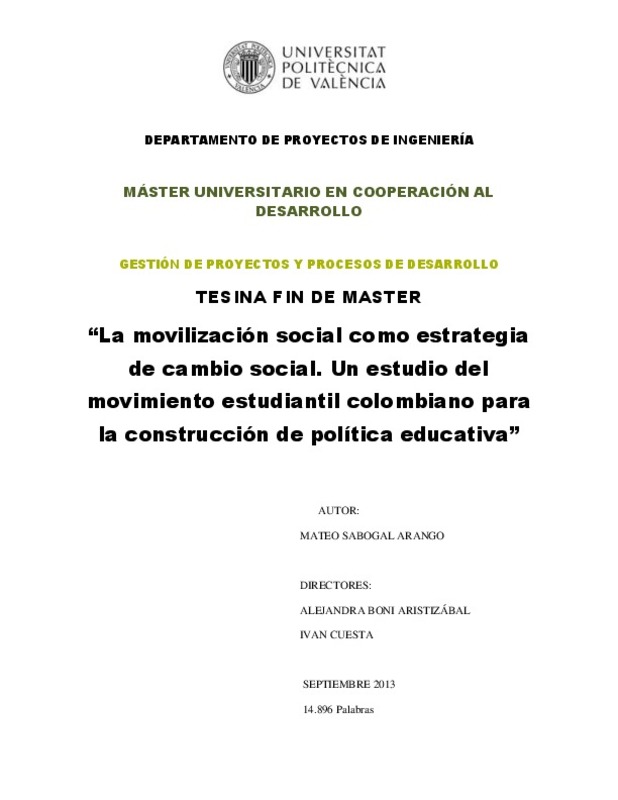|
Resumen:
|
[ES] La presente investigación tiene el propósito de evidenciar la forma en que las movilizaciones sociales
siguen constituyéndose como una de las herramientas más idóneas para generar procesos de cambio
en una sociedad. ...[+]
[ES] La presente investigación tiene el propósito de evidenciar la forma en que las movilizaciones sociales
siguen constituyéndose como una de las herramientas más idóneas para generar procesos de cambio
en una sociedad. El análisis del movimiento estudiantil colombiano en el año 2011, se convierte en un
objeto de estudio ideal, para const ruir un marco de análisis que permita dilucidar la manera en que el
fenómeno social logra aprovechar las condiciones de su entorno, para generar acciones colectivas que
permitan cumplimiento de su objetivo.
Para lograr lo anterior, se delimita la investigación en tres ejes fundamentales: 1) La Estructura de
Oportunidades Políticas, 2) Redes Organizacionales y finalmente 3) el Repertorio de Protesta. La
exploración y estudio de cada una de éstas permite un primer acercamiento a la forma en que los
movimientos sociales logran surgir y consolidarse en pro de un interés general. El marco teórico se
elabora con autores que han realizado exposiciones profundas del tema y se constituyen en un punto
de partida para el análisis de la problemática.
La metodología seleccionada se fundamenta en una epistemología interpretativa y una ontología social
constructivista, donde mediante entrevistas semi-estructuradas a los actores involucrados y un análisis
de documentos de prensa, permiten un análisis inductivo que conllevan a la construcción y un
entendimiento de la realidad, que aporta a la teoría expuesta en el documento. Durante el proceso
investigador, se elaboran categorías y sub-categorías que facilitan la comprensión del fenómeno social
de acuerdo a las evidencias halladas y se convierten en una alternativa de estudio para éste y otros
RESUMEN
movimientos sociales.
Como se evidenciará en páginas posteriores, se puede afirmar que la investigación cumple con su
objetivo. El contexto nacional e internacional del estado colombiano y la forma en cómo las
organizaciones estudiantiles se articulan conllevan el impedimento de la reforma legislativa a la
educación superior, brindándole insumas a la teoría seleccionada para el análisis de éste tipo de
fenómenos sociales.
[-]
[EN] The present research aims to show how social movements are becoming one of the most suitable tools
to generate processes of change in society. The analysis of the Colombian student movement in 2011,
becomes an ideal ...[+]
[EN] The present research aims to show how social movements are becoming one of the most suitable tools
to generate processes of change in society. The analysis of the Colombian student movement in 2011,
becomes an ideal case of study, to build a framework of analysis to elucidate how the social
phenomena can seize the condition of their environment, to generate collective action that allow fulfill
its purpose.
To achieve this, research is delimited on three key areas: 1) Política! Opportunity Structure, 2)
Organizational Networks and finally 3) Tactical repertoires of Protest. The exploration and study of
each of one allows a first approach to the way in which social movements emerge and consolidate,
towards a general interest. The theoretical framework is made with the ideas of authors who have
done significant investigations around the theme, what constitutes a starting point for the analysis of
the problem.
The methodology is based on an interpretive epistemology and constructivist social ontology, where
semi-structured interviews to the stakeholders and the an alvsls of press documents allow an inductive
.l- -~1 \ \.', Jl ~\e0~ ~,\ tw'i')v
UNIVERSIDJ.\0
POLITECNICL\
DE VL\LENCIL\
analysis that lead the construction and understanding of reality, which contributes to the theory
selected in the document. During the research process, are developed categories and sub-categories
that faci litate understanding of social phenomena according to the evidence found and, as result, it
become an alternative to study this and other social movements.
As will be evident in later pages, we can say that the research fulfills its goal. The national and
international context of the Colombian state, and the way in which students organizations articulates,
has as result the sinking of the legislative reform in the higher education, providing the theory inputs
to analyze this kind of social phenomena.
[-]
|







